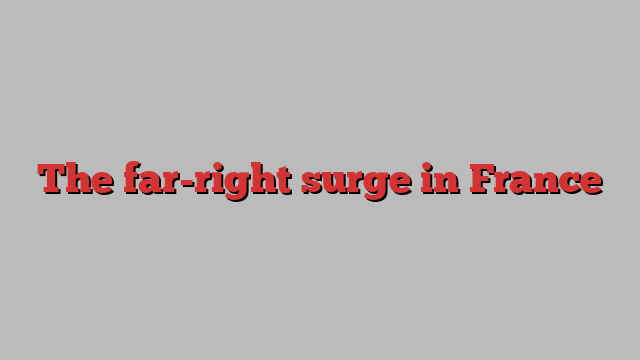
Unlock the Editor’s Digest for free
Roula Khalaf, Editor of the FT, selects her favourite stories in this weekly newsletter.
Emmanuel Macron’s gamble in calling snap parliamentary elections looks ever more foolhardy. In the first round, a majority of French voters have repudiated the president and the centrist reformism he has embodied for seven years; one-third voted for Marine Le Pen’s far-right Rassemblement National, on exceptionally high turnout. A hung parliament remains the most likely outcome after next Sunday’s second round. But RN has a chance of securing an absolute majority — imperilling the values of the French republic and sending ripple effects across the continent. RN’s opponents might still be able to prevent such an outcome.
There are no good options for France today. The worst, however, would be a majority RN government. Some argue that subjecting the extremist movement to the realities of governing would expose it for what it is. Indeed, part of Macron’s wager seemed to be that if it led to a spell of RN-led government, the president would be able to call out its excesses — and voters would be put off backing Le Pen to succeed him in 2027.
Yet, despite Le Pen’s efforts to “detoxify” RN, French voters should be under no illusions about what it represents. It comes from the dark side of France’s political tradition, whose instincts are authoritarian and nationalist. It is built on racist roots; its policies on immigration and “national preference”, aiming to favour French citizens over foreigners for social housing and welfare, are divisive and racially-driven.
The man who would be RN’s prime minister, 28-year-old Jordan Bardella, told the Financial Times last week he intended to wage a “cultural battle” against Islamism. He and Le Pen, who in the past have shown pro-Russia sympathies, have signalled they would challenge the president’s authority on foreign policy.
The best outcome would be for Macron’s centrists and the newly formed leftwing New Popular Front (NFP) to agree on a centre-left prime minister, and keep the RN from power. This would present dangers of its own. The NFP is also proposing high-spending policies that would risk exploding France’s finances. Markets are as nervous about the hard left as about the hard right.
A combination of the centrists and the leftist alliance might be incapable of governing effectively with Macron. Angry RN voters might feel ignored, and since far-right parties thrive on chaos, this could kick open the door to Le Pen in 2027. The risks are still fewer, however, than those of handing RN the keys to government now, and such an outcome would buy some time to start rebuilding the centre.
In constituency contests where RN can be beaten in the second round, Macron’s centrists and the NFP will have to act tactically. Each should agree to withdraw from hundreds of three-way races where the other has a better chance of prevailing, and call on their supporters to back the other camp in two-way run-offs with the RN.
Some in Macron’s camp, understandably, advocate withdrawing tactically only against “republican” opponents — implying not those from Jean-Luc Mélenchon’s far-left France Unbowed, or LFI. Anti-capitalist and Eurosceptic, Mélenchon has played down antisemitism in France. Fortunately, the LFI is not in a position to take power by itself, but some holding of noses will be required. Without it, the RN might have enough support to secure a majority.
The implosion of Macronism is regrettable for France, the EU and western democracy. The president himself bears much responsibility: his imperious style, and some necessary if unpopular reforms, drove voters away, even if there are also deeper causes of France’s malaise. These elections will not resolve France’s woes and indeed could exacerbate them. Politicians, however, must at least ensure that the elections do not jeopardise the liberal democracy France has lived under since the end of the second world war.